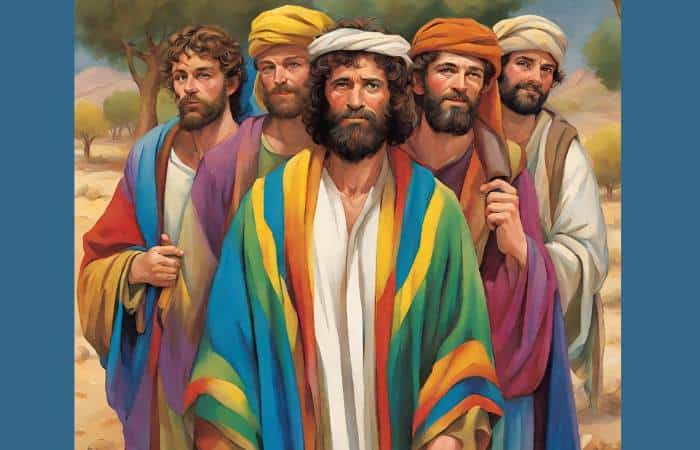Introduction: Understanding the Parable of the Bags of Gold
This great parable from a section of scripture in Matthew’s Gospel, chapter 25: 14-30 tells the account of a rich man who entrusts his money to his servants while he goes away on a journey. So, let’s turn to the Gospel of Matthew and see if we can draw some of the great meaning of the parable.
The parable of the bags of gold is traditionally called the parable of the “talents” in most of the other top Bible translations such as the King James Version and others. However, the word “talents” as used today is usually a skill or giftedness in some areas, The popular New International Version uses “bags of gold” rather than talents. The New Living Translation uses silver rather than gold. In this post, we will, for the most part,” use “bags of gold” or “talent”
To put it into perspective, a bag of gold or talent was worth about 6,000 denarii, which was equivalent to the wages of a laborer for about 20 years. So, the first servant received the equivalent of 20 years’ worth of wages, the second servant received 8 years’ worth, and the third servant received 4 years’ worth. This demonstrates that the master entrusted significant amounts of money to his servants, emphasizing the weight of that responsibility.
The Parable of the Bags of Gold
Jesus is speaking:
14 “Again, it will be like a man going on a journey, who called his servants and entrusted his wealth to them. 15 To one he gave five bags of gold, to another two bags, and to another one bag, each according to his ability. Then he went on his journey. 16 The man who had received five bags of gold went at once and put his money to work and gained five bags more. 17 So also, the one with two bags of gold gained two more. 18 But the man who had received one bag went off, dug a hole in the ground and hid his master’s money.
Matthew 25:14-18
Central Message of the Parable
This parable of Jesus is noted for its challenge to properly steward resources. He teaches important lessons about faithfulness, stewardship, and the kingdom of God. It has relevance to believers in their everyday lives with their relationship with God.
Through this parable, the word of God teaches us that God entrusts each of us with gifts, resources, or perhaps just a natural ability in some area. His love for our well-being means that He has a great desire for us to use them wisely and productively for His glory. This call from this parable is for us to be faithful stewards of what our gracious God has given us.
I can think about times when I used resources or ability for God’s purpose and times when I failed. I think we all could. Here, Jesus is reminding us that we are accountable for how we invest and multiply the resources that God has given us. Through the parable, we would consider the master as Jesus and the servants as His followers who should serve Him well while He is gone.

Jesus challenges us to consider how we are using our time, talents, and treasures to advance His kingdom.
An Illustrative Narrative: The Three Servants
Let’s talk about the three servants who received different amounts of bags of gold, money, or talents, from their master. The first servant received five bags of gold or talents, the second received two bags or talents, and the third received one.
The master entrusted these talents to his servants, expecting them to use and multiply them while he was away. When the master of those servants returned, he called his servants to give an account of their stewardship.
To the master’s happiness, the first servant had doubled his talents and presented the master with ten talents and much profit. The second servant had also doubled his talents, providing the master with more material wealth, and gave the master four talents.
the first two servants had seen this as an opportunity to do good and be responsible for what the master had entrusted to them. They saw it as a joyful responsibility to multiply what they had been given.
19 “After a long time the master of those servants returned and settled accounts with them. 20 The man who had received five bags of gold brought the other five. ‘Master,’ he said, ‘you entrusted me with five bags of gold. See, I have gained five more.’
21 “His master replied, ‘Well done, good and faithful servant! You have been faithful with a few things; I will put you in charge of many things. Come and share your master’s happiness!’
22 “The man with two bags of gold also came. ‘Master,’ he said, ‘you entrusted me with two bags of gold; see, I have gained two more.’
23 “His master replied, ‘Well done, good and faithful servant! You have been faithful with a few things; I will put you in charge of many things. Come and share your master’s happiness!’
Matthew 25:19-23
However, the third servant had simply buried his talent out of fear and the willingness to get out of his comfort zone and returned it to the master without any increase.
Burying the money might have been the absolute safest way to keep the money intact. However, scholars tell us that there were ways of at least making a small profit with very little risk to the money. Therefore, it is thought that the third servant just didn’t care about his master’s money. A small profit would have been very easy to make had he made an effort.
The master commended the first two servants for their faithfulness and rewarded them with increased responsibility and a share in his joy. But he condemned the third servant for his laziness and fearfulness, taking away his talent and casting him into outer darkness.
The master commended the first two servants for their faithfulness and rewarded them with increased responsibility and a share in his joy.
Why the severity of the punishment for the third servant? The notes in the CSB Study Bible call this third servant a “false disciple.” So, it’s possible that as the parable is interpreted the first two servants would illustrate true followers of Christ with varying gifts or degrees of service.
However, the third servant may well represent a person who was not a genuine believer or follower of Christ and, therefore, received the punishment as a non-believer would.
24 “Now the one who had received the one talent also came up and said, ‘Master, I knew you to be a hard man, reaping where you did not sow, and gathering where you did not scatter seed. 25 And I was afraid, so I went away and hid your talent in the ground. See, you still have what is yours.’
26 “But his master answered and said to him, ‘You worthless, lazy slave! Did you know that I reap where I did not sow, and gather where I did not scatter seed? 27 Then you ought to have [g]put my money in the bank, and [on my arrival I would have received my money back with interest.
28 Therefore: take the talent away from him, and give it to the one who has the ten talents.’29 “For to everyone who has, more shall be given, and he will have an abundance; but from the one who does not have, even what he does have shall be taken away. 30 And throw the worthless slave into the outer darkness; in that place there will be weeping and gnashing of teeth.
Lessons Derived and Their Implications
Well, let’s not be content to see what the parable means, but discover what lessons the parable of the bags of gold teach us. It teaches us several important lessons about being good stewards.

Faithfully Using Resources and Abilities
First, it emphasizes the weight of responsibility and the importance of faithfully using the resources that God has given us. Each servant was entrusted with a different amount of talents according to their abilities, highlighting the fact that God knows our unique capacities and expects us to be faithful to what we have been given.
This brings up another question: What is the significance of the different amounts of money given to the servants? The different amounts of money given to the servants in the parable represent the varying levels of responsibility and ability that God has entrusted to each believer.
Perhaps your friend or neighbor is the pastor of a large church and in full-time church ministry. However, perhaps you are a business person in a “secular” job. God may have called the pastor to shepherd a large congregation of people while you might only influence a much, much smaller group of people. Maybe it’s a small group or Sunday school class.
Just as the master distributed the bags of gold according to the servants’ abilities, God has given each of us unique gifts, resources, and opportunities. The parable teaches that God knows us individually and has entrusted us with what is appropriate for our abilities. He is not going to expect us to do good work for him and not give us the ability to do so in some way.
Or maybe you use your organizational gifts to volunteer in other areas to serve God. The point is that God is pleased with each of His children as they use their particular gift for His glory.
And remember, God is a God of grace and, although he wants us to do good works for His kingdom, we are not forgiven or accepted by our works. We are accepted and forgiven by God based on our faith in the death and resurrection of Jesus Christ.
Letting the Holy Spirit Guide Us
If we are to develop a deep, true relationship with our heavenly Father, we should make the decision to allow the Holy Spirit to work through us to help advance the kingdom of heaven and share the good news of the Gospel. We need to rely on Him every day to guide us in obedience to Christ and know that we are loved and accepted by Christ.
When we serve out of the truth that God is One who accepts us on the basis of what Jesus did for us, then we can serve out of love and thankfulness rather than fear from a cruel taskmaster. I believe that this is how the first two servants in the parable served the master.
Consequences of Neglect and Wasted Potential
On the other hand, the third servant who neglected his talent and failed to multiply it faced severe consequences. Once again, this doesn’t mean that God is a cruel taskmaster, but there is a thing called God’s judgment.
In this parable, the slothful servant was rebuked by the master, and, in our interpretation, may represent one who never has received Jesus Christ as Lord and will never enter heaven. who was a wealthy man and expected more of his servants. So, the lazy servant had his talent or single bag of gold taken away from him and given to the more trustworthy servants. This highlights the importance of not neglecting or wasting the resources that God has entrusted to us.
Spiritual Gifts in the Local Church and Community
The parable of the bags of gold also challenges believers to consider their use of time and talents outside of their professional lives. Every believer has been uniquely gifted by God with spiritual gifts such as teaching, evangelism, mercy, or administration. These gifts are not meant to be hidden or kept to oneself but are to be used for the edification of the body of Christ and the advancement of the kingdom of God..
Lessons for Faithful Servants: Rewards and Blessings
The parable of the bags of gold underscores the qualities and outcomes associated with being a faithful servant. Those who are diligent and trustworthy in their stewardship will someday receive recognition and blessings from their master.
Faithful servants are not only rewarded for their diligence but are also given more significant responsibilities and the privilege of partaking in their master’s joy. The rewards for faithful service go beyond mere material gain and resonate with a deeper spiritual joy.
The Missionary: An Exemplar of Faithfulness
Take, for instance, the life of a dedicated missionary. Committed to the great commission, they venture to a foreign land, immersing themselves in its culture and language. Through perseverance, they form bonds with the community, addressing both spiritual and material needs. As a result of their unwavering commitment, a thriving local church emerges, transforming many lives.
The missionary’s dedication earns them respect and admiration from both the local inhabitants and their parent organization. Recognizing their effective stewardship, they’re given further opportunities to expand the kingdom of God. This scenario is a testament to the blessings and acknowledgments that come from faithfully utilizing the talents God bestows upon us.
The True Essence of Joy in Service
However, the parable also suggests that the essence of serving faithfully isn’t merely about reaping rewards; it’s about the profound joy experienced when participating in God’s grand design. When we align ourselves with God’s will we can experience joy unlike no other.
The ‘joy of their master’ that the diligent servants partake in symbolizes the profound happiness derived from harmonizing with God’s objectives and observing the positive ripple effects of one’s service.
It’s a joy that isn’t transient but reverberates eternally. Through this parable, we are reminded that the life of a faithful servant isn’t centered on personal benefits. Instead, it revolves around becoming an instrument of God’s work and relishing the immeasurable joy stemming from unconditional service.
H3 – Stewardship: God’s Resources in Our Hands
At the heart of one interpretation lies the principle of stewardship. Here, believers are reminded that all they possess, be it talents, time, or treasures, ultimately belongs to God. Their role is akin to custodians entrusted with these assets. The essence of this perspective is to motivate Christians to judiciously utilize these resources, aligning with God’s will and purpose, thereby advancing His kingdom. This view underscores the importance of living life in a way that reflects God’s values, ensuring that everything is invested wisely to magnify His glory.
H3 – A Prophetic Warning: The Last Days
Diving deeper into the biblical context, another interpretation relates the parable to the eschatological timeframe, particularly the days preceding Christ’s second advent. This view posits that the parable serves as a cautionary tale, especially for the people of Israel during the end times.

The narrative prompts them to remain vigilant and devoted to their duties, awaiting the Messiah’s return, bearing in mind the eternal significance of their earthly decisions.
As followers of Christ, we should be aware of the biblical prophecies concerning Israel, the end times, and the return of Christ.
An Invitation to Introspection
Central to all these interpretations is an invitation. The parable will allow us to focus and evaluate our lives in the light of the resources that they have been entrusted with. It encourages believers and non-believers alike to assess their values, priorities, and actions, making adjustments where needed to harmonize with divine objectives or broader ethical principles.
Embracing a Life of Intentional Choices

The parable serves as an invitation for intentional living. Every day, we are presented with many choices. The parable’s challenge is clear: make choices that resonate with God’s heart. This intentionality ensures that every resource – be it time, talent, or treasure – is directed towards eternal purposes.
For more on this parable, check this post out at FindingGodAmongUs.com.
Conclusion: Living a Life of Faithful Stewardship
The parable of the bags of gold stands as a testament to the responsibility, privilege, and joy that each believer carries. This insightful story has some very rich spiritual truths and encourages us to examine how we steward the blessings that God has given us.
Just as the master in the parable expected returns on his investment, God wants believers to use gifts and resources for kingdom purposes. This calls for proactive engagement, wisdom, and discernment in using what’s been entrusted to our care.
Also, let us be in anticipation of Christ’s return. The parable doesn’t only speak of investment, but it underscores the urgency of being prepared. Every action, every investment, and every choice is made as we look at the knowledge of eternity.
“Well done, good and faithful servant,” is the aspiration of every believer. These words aren’t just an acknowledgment of duty done but are an affirmation of a life lived in alignment with God’s heart. This parable can remind us that the ultimate reward isn’t just in the accolades or the material increase but in sharing the joy of the Master.
As we reflect upon the parable of the bags of gold, I hope it will encourage us all to live our lives with purpose, diligence, and faithfulness in the kingdom of God,





Leave a Reply